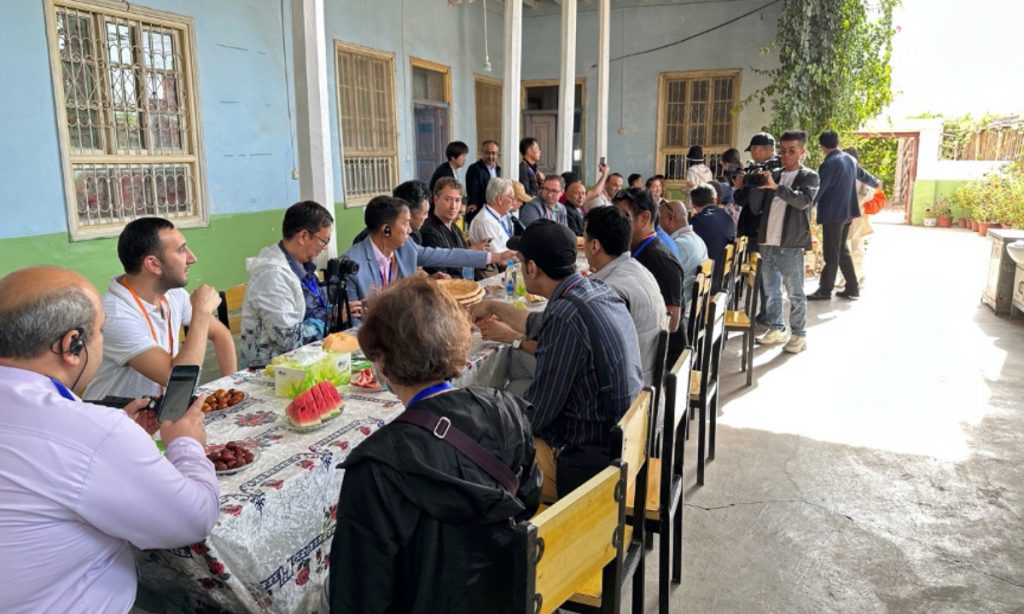Published:October 01,2023

A group of 22 foreign reporters and visitors completed their nine-day interviews and visiting trip themed “Seminar for Media Directors of The Silk Road Economic Belt Countries” across Northwest China’s Xinjiang Uygur Autonomous Region on Friday.
During the trip, the Global Times found that some of the foreign reporters described Xinjiang’s economic development as “vibrant economy” and “bustling economy” especially when visiting local markets and commercial scenic spots such as the International Grand Bazaar in Urumqi and the ancient city of Kashi.
Donovan Ralph Martin, CEO of the Canada-based Daily Scrum News, was among the ones regarding the regional economy as “bustling.” He told the Global Times that he would describe Xinjiang as “more than developing” to those who have never been to the region.
Martin said that some parts in Xinjiang are fully developed while some are utilizing the resources to put themselves in a good position for success.
The development of Xinjiang is fast, as the progress can be reflected everywhere from new houses, cars to people’s clothes and shops, Frank Willems, editor of the Chinasquare website based in Belgium who also visited Xinjiang for the second time since 2008, told the Global Times.
Willems added that the biggest change he noticed that is the region’s opening to the rest of the world after visiting multiple local land ports and trade zones such as the Urumqi International Land Port Area.
The foreign journalists have generated a more comprehensive understanding of Xinjiang’s role in constructing the Belt and Road Initiative (BRI) after touring the land ports and trade zones. Meanwhile, as 2023 marks the 10th anniversary of the BRI, some of them from the countries participating in the joint building of the BRI told the Global Times that they expect the cooperation to continue deepening.
The China-Kazakhstan International Cooperation Center in Horgos can be a bridge between Kazakhstan and China, and a bridge between China and the European countries, Yerzhan Bagdatov, director of Toppress.kz news agency based in Kazakhstan told the Global Times after visiting the cooperation center. Bagdatov said that more cooperation potential could be explored in aspects like the machinery in the future.
The BRI may put Indonesia in a prominent position in global trade, supported by its large population and rich mineral resources, Aditya Hadi Pratama, a senior business writer from the Jakarta Post, told the Global Times. He added that he understands Xinjiang plays a significant role in the BRI and it is the front door to connect China with other regions in the West.
During the visit, the foreign journalists also had chances to experience the rich and diverse culture presented in various formats from learning about the craft of traditional folk instruments to participate in performances presented in local songs and dance.
Xinjiang is a colorful region full of cultural, religious and ethnic diversity, said Mohammad Reza Noroozpour and Maryam Farhang, two journalists from Iran.
The foreign journalists also expressed their appreciation for China’s efforts in preserving the region’s traditional culture, creating a harmonious and prosperous life for local people from different ethnic groups and those with religious belief, and fighting against terrorism and extremism, the Global Times learned.
In contrast with some Western media efforts to peddle disinformation, the foreign journalists now have formed a comprehensive and full image of Xinjiang after experiencing and observing the region’s rapid development combined with its diverse culture, vibrant economy, social stability and hardworking people.
Iati Iati, a senior lecturer in Politics and International Relations from Victoria University of Wellington from New Zealand, said that certain Western media is putting out a false narrative about Xinjiang as to the motives for [smearing China], and he strongly believes that is geopolitical.
“I think they work in conjunction with certain Western governments who are afraid of the rise of China economically, especially with the BRI,” he said.
As the journey was approaching to the end, some foreign journalists expressed their interests to revisit Xinjiang while encouraging more people to travel to the region and experience on their own.
Mussolini Sinsuat Lidasan, a columnist from the Davao Sun Star News in the Philippines, encouraged people to visit places like Xinjiang and experience the rich culture and traditions in Xinjiang and how they were able to combine economic development and traditions, instead of believing the fake news or so-called academic “experts.”
Sources: GlobalTime
 Africa -China Review Africa -China Cooperation and Transformation
Africa -China Review Africa -China Cooperation and Transformation
